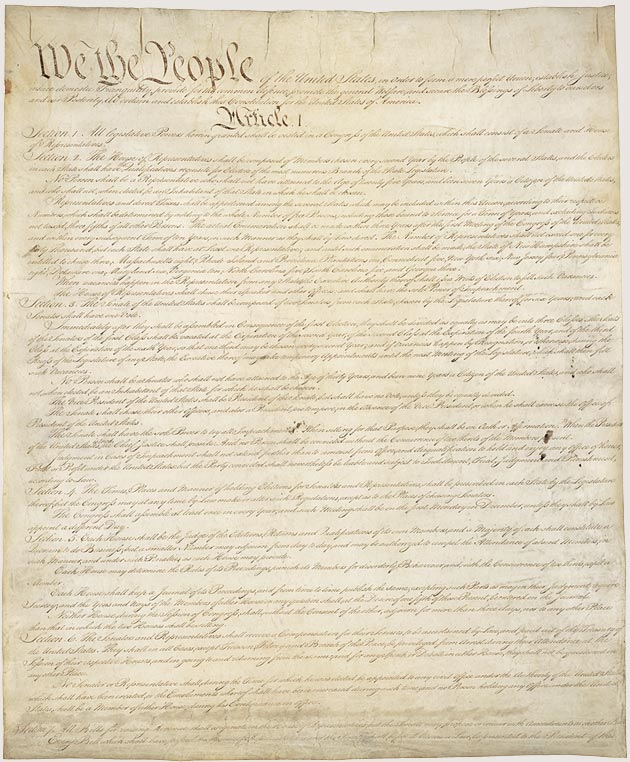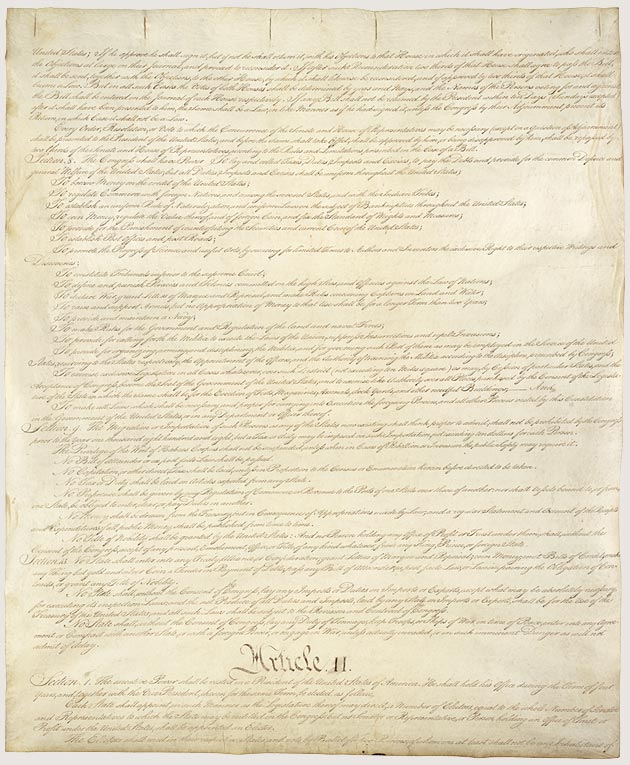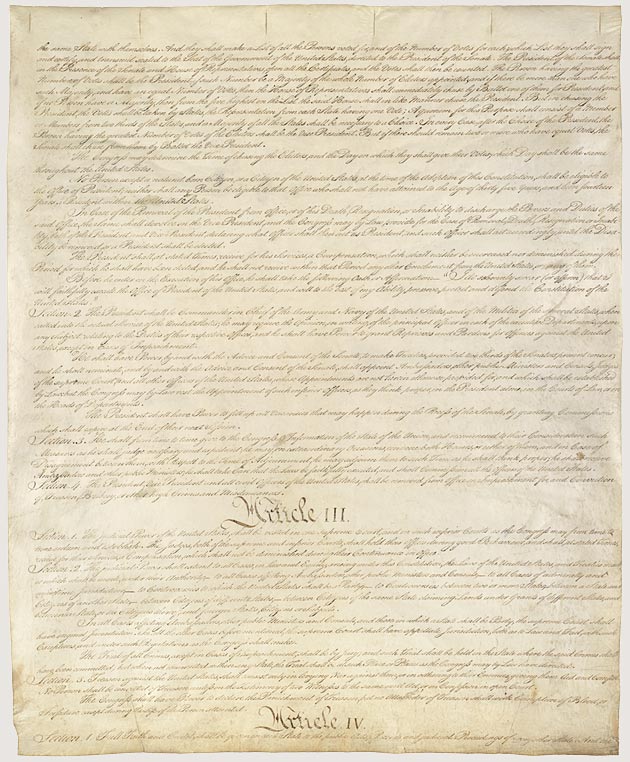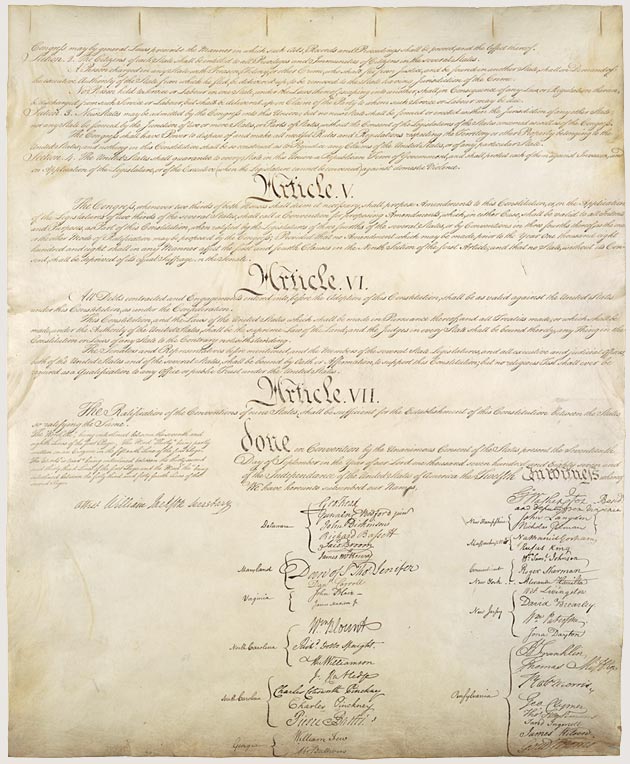|
Original U.S. Constitution
Copy of the Constitution
Original Copy of the United States Constitution

Original Copy of the Constitution of the United States of America, page 1

Original Copy of the Constitution of the United States of America, page 2

Original Copy of the Constitution of the United States of America, page 3

Original Copy of the Constitution of the United States of America, page 4
Source: Constitution of the United States: Signed Copy of the Constitution of the United States; Miscellaneous
Papers of the Continental Congress, 1774-1789; Records of the Continental and Confederation Congresses and the Constitutional
Convention, 1774-1789, Record Group 360; National Archives.
Recommended Reading: The Declaration
of Independence and the Constitution of the United
States of America. Description: To encourage people everywhere to better understand and appreciate the principles of government that
are set forth in America’s founding documents, the Cato Institute published this pocket edition of the Declaration of
Independence and the Constitution of the United States of America. With more than three million copies in print, this edition’s
influence has been observed far and wide. It has been held up by senators at press conferences and by representatives during
floor debate; found in federal judicial chambers across the country; appeared at conferences on constitutionalism in Russia, Iraq,
and elsewhere; and sold at U.S. Park Service stores, Restoration Hardware, and book stores around the country. It’s
a perfect gift for friends and family. Order your copies today!
Recommended Reading: The Heritage Guide to the Constitution, by Edwin Meese (Author), Matthew Spalding (Editor),
David F. Forte (Editor), Matthew Spalding (Author), David F. Forte (Author) (Hardcover). Description: This guide is the first of its kind, and presents the U.S. Constitution as never
before, including a clause-by-clause analysis of the document, each amendment and relevant court case, and the documents that
serve as the foundation of the Constitution. About the Authors: Edwin Meese III served as the 75th Attorney General of the
United States
under President Reagan. Continued below...
The Chairman of the Editorial Advisory Board, he is a distinguished legal expert and holds the Ronald Reagan
Chair in Public Policy at the Heritage Foundation; Executive Editor Dr. Matthew Spalding is an expert in and teaches constitutional
history, is an Adjunct Fellow of the Claremont Institute, and is the Director of the B. Kenneth Simon Center for American
Studies at the Heritage Foundation; Senior Editor Dr. David F. Forte is a widely published legal scholar, a former Chief Counsel
to the United States Delegation to the United Nations, and the Charles R. Emrick, Jr. —Calfee Halter & Griswold
Professor of Law at Cleveland State University.
Recommended
Reading: Founding Brothers: The Revolutionary Generation. Review: In retrospect, it seems as if
the American Revolution was inevitable. But was it? In Founding Brothers, Joseph J. Ellis reveals that many of those truths
we hold to be self-evident were actually fiercely contested in the early days of the republic. Ellis focuses on six crucial
moments in the life of the new nation, including a secret dinner at which the seat of the nation's capital was determined--in
exchange for support of Hamilton's financial plan; Washington's
precedent-setting Farewell Address; and the Hamilton and Burr duel. Most interesting, perhaps, is the debate (still dividing
scholars today) over the meaning of the Revolution. Continued below...
In a fascinating
chapter on the renewed friendship between John Adams and Thomas Jefferson at the end of their lives, Ellis points out the
fundamental differences between the Republicans, who saw the Revolution as a liberating act and hold the Declaration of Independence
most sacred, and the Federalists, who saw the revolution as a step in the building of American nationhood and hold the Constitution
most dear. Throughout the text, Ellis explains the personal, face-to-face nature of early American politics--and notes that
the members of the revolutionary generation were conscious of the fact that they were establishing precedents on which future
generations would rely. In Founding Brothers, Ellis (whose American Sphinx won the National Book Award for nonfiction in 1997)
has written an elegant and engaging narrative, sure to become a classic. Highly recommended.
Recommended
Viewing: Founding Brothers (A&E)
(200 minutes). Description: The political wrangles
of a fledgling country may sound dull compared to the drama of a war, but the early history of the United States
only gets more fascinating as the Revolutionary War is left behind. Founding Brothers, a documentary from the History Channel,
examines the struggle to not only establish democracy, but to give it the economic strength and governmental structure that
will allow it to survive and thrive. George Washington grappled not only with politics, but with questions of style and propriety--how
should a president, as opposed to a king, behave? Understanding the conflicts between Alexander Hamilton, John Adams, and
Thomas Jefferson will illuminate ideas that have shaped the government of the U.S.
ever since. Continued below…
Founding Brothers
provides a wealth of portraits and illustrations from the time, as well as discreet dramatizations, that bring the rise of
party politics to life, humanizing these historical figures with tales of the scandals and squabbles they faced as well as
their political achievements. An excellent introduction to the roots of the American experiment, and a bracing illustration
of what Jefferson
meant when he said of the presidency, "No man will bring out of that office the reputation which carried him into it."
Recommended Reading:
The Constitution of the United States of America,
with the Bill of Rights and all of the Amendments; The Declaration of Independence; and the Articles of Confederation, by Thomas Jefferson (Author), Second Continental Congress (Author),
Constitutional Convention (Author). Description: Collected in one affordable volume are the most important
documents of the United States of America: The Constitution of the United States of America, with the Bill of Rights and all
of the Amendments; The Declaration of Independence; and the Articles of Confederation. These three documents are the basis
for our entire way of life. Every citizen should have a copy.
Recommended Reading: America's Constitution: A Biography (Hardcover). Publishers Weekly: Starred
Review. You can read the U.S. Constitution, including its 27 amendments, in about a half-hour, but it takes decades of study
to understand how this blueprint for our nation's government came into existence. Amar, a 20-year veteran of the Yale Law School
faculty, has that understanding, steeped in the political history of the 1780s, when dissatisfaction with the Articles of
Confederation led to a constitutional convention in Philadelphia,
which produced a document of wonderful compression and balance creating an indissoluble union. Amar examines in turn each
article of the Constitution, explaining how the framers drew on English models, existing state constitutions and other sources
in structuring the three branches of the federal government and defining the relationship of the government to the states.
Continued below...
Amar takes
on each of the amendments, from the original Bill of Rights to changes in the rules for presidential succession. The book
squarely confronts America's involvement with slavery, which the original Constitution
facilitated in ways the author carefully explains. Scholarly, reflective and brimming with ideas, this book is miles removed
from an arid, academic exercise in textual analysis. Amar evokes the passions and tumult that marked the Constitution's birth
and its subsequent revisions. Only rarely do you find a book that embodies scholarship at its most solid and invigorating;
this is such a book.
Recommended Reading: The U.S. Constitution: And Fascinating Facts About It. Description: In The U.S. Constitution & Fascinating Facts About It you'll see the entire text
of the Constitution, the Bill of Rights and the Declaration of Independence--and much more! You'll find interesting insights
into the men who wrote the Constitution, how it was created, and how the Supreme Court has interpreted the Constitution in
the two centuries since its creation.
Recommended Viewing: Just The Facts - The United States Constitution. Description: Just the Facts: The United States Constitution is
a superior video resource for history and social studies classrooms. Teachers and parents can use this to make the Constitution
accessible on many levels. The program is targeted at junior high and high school freshmen and sophomores and is divided into
sections corresponding to the articles of the Constitution. With contributions from experts on constitutional history and
theory, the program lacks flashy production values but is nonetheless engaging. "...Outstanding for teachers and educators."
Recommended Reading: The Complete
Idiot's Guide to the U.S. Constitution.
Description: The “living” document that changed the world. One of the most revered, imitated, and controversial
government documents in the world, the U.S. Constitution serves as the foundation for the American government and shapes the
lives of Americans every day. But how many know its history and the impact it’s had on American laws and practices throughout
history? This guide serves as the most current and accessible handbook to this all-important document. —Covers the document
itself, as well as controversial interpretations and decisions.
Recommended Reading: Original Meanings: Politics and Ideas in the Making of the Constitution. Description:
Imagine, for a preposterous moment, that 55 national leaders convened to write a document to guide the country for hundreds
of years. It seems unlikely--given that our current contingent of so-called leaders can't agree on how to balance a checkbook--that
they could reach consensus on such issues as the allotment of congressional seats. The political and ideological issues that
faced the creators of the Constitution were similar in some ways to those at play today. And in some ways they were vastly
different ones. Jack Rakove, a history professor at Stanford University, has in this book framed the process that led to the
drafting of the constitution in its historical and political context to offer insight into the difficulty of interpreting
that most influential of documents.

|

